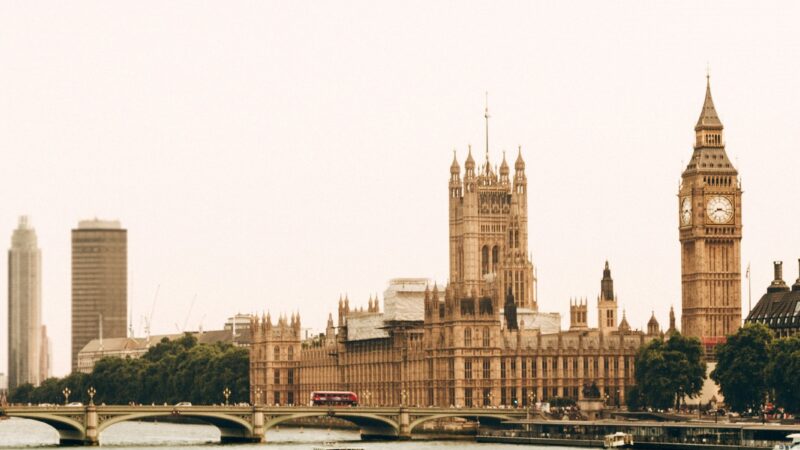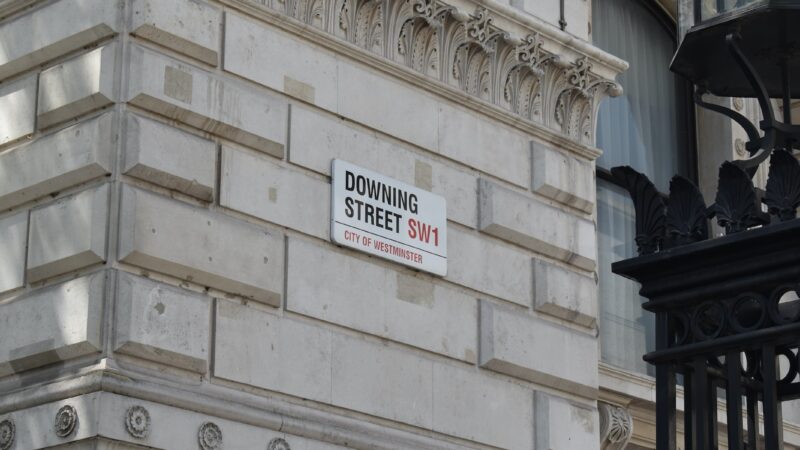The Path of Reconstruction
As every British conservative writer, pundit, and academic will tell you, Prime Minister Benjamin Disraeli once said:
“The Conservative Party is a national party, or it is nothing.”
How right he was! Having ceased to be a national party in both respects, dispensing with any meaningful concept of the nation and placing all its chips on a concentrated slither of the Grey Vote – a demographic which it’s managed to alienate after a completely avoidable PR disaster – the party is on track to be reduced to nothing come this year’s general election.
Based on recent polling, the Tories are competing for a distant second with the Liberal Democrats, leading many to suggest 2024 is going to be Britain’s equivalent of Canada’s 1993 federal election, in which a centre-left lawyer secures a majority after the unpopular centre-right government, headed by an unlikeable first-of-their-kind Prime Minister, was decimated by a vote-splitting right-wing populist upstart called Reform.
Given this, it is worth considering the possibility of a Canada ’93-style erosion of the Conservative Party over the next five years and what this will mean for the British right, assuming it’s going to be represented by Reform UK or a different party arising from a merger between the two. After all, by his own admission, Farage isn’t trying to win the general election, stating it won’t determine which party enters government (rest assured, it will be Labour) but will determine which party leads the opposition.
The collapse of the Progressive Conservative Party – Canada’s main centre-right party – coincided with the rise of the Reform Party of Canada (RPC); a right-wing populist party founded in the 1980s and led by Preston Manning. The RPC originated as a pressure movement for advancing the interests of Western Canada, whose inhabitants felt increasingly alienated by the central government, especially as constitutional issues increased in salience. The RPC was particularly suspicious of attempts to grant “distinct society” status to Quebec, believing Canada was a federation of similar and equal provinces united by a set of rights and obligations, rather than an essentially multicultural and bilingual state.
As the RPC sought to become a national party, it was required to expand its appeal and therefore its political platform. The party dispensed with its Western-centric agenda and outright rejected calls within its rank-and-file for Western Canadian independence. In its place, the RPC formulated a platform dedicated to shrinking the size of the central government, lowering taxes, making considerable cuts to government spending, pursuing free trade agreements, supporting Christian social values, promoting direct democracy, and advancing political reform.
After its electoral breakthrough in 1993, the RPC continued to broaden its appeal, softening its positions to attract more moderate-minded voters in Canada’s Eastern provinces. Whilst the 1993 manifesto provided an extensive 56 reasons to vote for the party – over half of which dealt with the party’s core concerns, treating areas outside their remit with scarce detail – the party’s 1997 manifesto condensed its list of policies, softened its position on tax-and-spend, made national unity a top priority, and generally provided more thorough proposals. The party also openly disassociated with views which invited accusations of bigotry, intolerance, extremism but retained a focus on family-oriented social conservatism.
In the 1997 federal election, the RPC would increase its vote share and total number of seats, becoming the largest party in opposition and solidifying itself as the main conservative party in Canada. The party held onto its Western support base and managed to strengthen its influence in the Prairies, but still struggled to find support among moderate Atlantic Canadians, many of whom continued to support the PCP, despite its greatly diminished political influence. For the most part, the RPC was still viewed (and still functioned in many ways) as a regional party, seen by many as the Western equivalent of the Bloc Québécois – a party dedicated to the interests of Quebec and another major winner in the 1993 federal election.
To complicate matters further, the Liberal government of Jean Chrétien pursued greater financial discipline in order to reduce the national deficit. This occurred during a period of “constitutional fatigue” which tail-ended a turbulent period of controversial proposals for reform. As fiscal conservatism and political reform were the RPC’s core concerns, the party often struggled to oppose government policy despite being the largest party in opposition, simultaneously trying to integrate its newfound responsibilities (and privileges) with its populist background.
Concluding it needed to broaden its appeal even more, the RPC merged with several provincial wings of the PCP into a new right-wing party: The Canadian Alliance.
Similar to the RPC, the party continued to adapt its image, refine its positions, and broaden its platform. However, unlike the RPC’s 1997 manifesto, which largely homed-in on the party’s approach to its core issues, the CA’s 2000 manifesto paid greater attention to issues beyond the RPC’s traditional remit, such as international affairs, environmental conservation, and technological change, all whilst carrying over RPC policy on tax-and-spend, decentralization, and family values.
Alas, despite these efforts, the Canadian Alliance (CA) was short-lived, existing for less than half-a-decade, and was widely viewed as the RPC under a different name. The party would place second in the 2000 federal election, increasing its share of the vote and its number of seats as the RPC had done in 1997, but not before playing host to a major change in the Canadian political landscape: the end of Preston Manning’s leadership. For most members, a new party required new management, so the bookish Manning was ousted in favour of the clean-cut (but also gaffe-prone) Stockwell Day, whose outspoken evangelical views often contrasted his own party’s efforts at moderation.
The Canadian right would remain out of power until 2006, in which the newly founded Conservative Party of Canada (CPC), led by Stephen Harper, a former policy advisor to Preston Manning, defeated the incumbent Liberal Party and formed a minority government. Founded in 2003, the CPC was created from a full and official merger of the CA and the PCP. Combining policies and aspects of their intellectual traditions, the merger reinvigorated the centrality of fiscal conservatism in the Canadian centre-right, and united Canada’s once-divided right-leaning voters under one national banner.
Although courting the Christian right, Harper displaced the last remnants of the RPC’s populistic social conservatism to the party’s periphery, entrenching economic liberalism as the backbone of the CPC’s electoral coalition whilst formulating stances on a variety of issues, from immigration to arts and culture, from constitutional reform to public transit, from foreign policy to affordable housing, from international trade to social justice.
As it took roughly five years and two election cycles for the RPC to destroy and absorb the PCP, it’s possible that Farage is banking on achieving something similar. However, what this implies is that Farage intends to oversee the destruction of the Conservative Party, but not the reconstruction of Reform UK – at least, not in a frontline capacity. Once the Conservative Party has been sufficiently diminished, a relatively younger and less controversial candidate will take the reins and transform it into a political force which can continue to fight national elections and possibly form a government; someone to move the party away from ‘negativistic’ anti-establishment populism – primarily acting as a vessel for discontent at the insufficient (if not outright treacherous) nature of recent Conservative Party policy – and fully towards ‘positivistic’ solution-oriented policymaking and coalition-building.
Assuming this is Reform UK’s plan, seeking to replace the Tories after beating them into the ground over the course of a five-year period, Reformers must internalise a major precondition for success; besides, of course, overcoming the perennial task of finding someone who can actually replace Farage when he stands aside.
In admittedly generic terms, just as the RPC/CA had to find support outside of Albertan farmers, Reform UK (or the hypothetical post-merger party) will need to find support outside of its core base of Leave-voting pensioners in East Anglia.
At some point, Britain’s populist right must become accustomed to acknowledging and grappling with issues it instinctively prefers to shy away from and keep light on the details; issues which remain important to much of the electorate and remain relevant to governing: the environment, technological change, the minutiae of economic policy, tangible health and welfare reform, foreign policy and international trade, food and energy security, the prospects of young people, broader concerns regarding economic inequality and social injustice, so on and so forth.
If this sounds similar to the criticism directed at the liberal-left’s aversion to immigration, demographics, traditional culture, and crime in a way that befits public concern and the national interest, that’s because it is.
There are many issues one could use to convey this point, but the environment is undoubtedly the best example. According to regularly updated polling from YouGov, the environment is a priority for roughly 20% of the electorate; only the economy, immigration, and healthcare are classed as more important by the general public, and housing, crime, and national security are considered just as important. Young voters emphasise the environment more than older voters. From the get-go, it’s clear that an environmental policy will be an unavoidable component of any national party and certainly one with a future.
Compare this to Reform UK’s recently released ‘Contract with the People’, which does not possess a subsection dedicated to the environment. Rather, it has a section dedicated to Net Zero and its abolition. On the whole, the subject is dealt with in a negativist manner, merely undoing existing measures, replacing them with nothing, all without reframing the issue at hand. At best, one can find some commitments to tree-planting and cutting down on single-use plastics. As most should have surmised by now, parties can’t afford to be meagre with environmental propositions – go big or go home!
Of course, none of this is surprising. After all, according to Richard Tice, Chairman of Reform UK, concerns about climate change are misguided because the climate has always been changing; it’s a process which can’t be stopped, but it’s OK because carbon dioxide is “plant food” anyway. It’s not happening, and that’s why it’s a good thing.
Indeed, leftists look stupid when they insinuate a similarity between a depoliticised process of post-war mass immigration to the Norman Conquest, so what does the British right have to gain by comparing manmade carbon emissions to the K-Pg extinction event? If not out of strong environmentalist convictions, any force eager to replace the Tories as the primary right-leaning party in Britain must be realise such issues cannot be left untouched – even those issues one might say the Tories have embraced too much or in ways which aren’t in the national interest.
As we look to other right-wing populist upstarts across the Western world, it’s clear that such a realisation is not optional, but a precondition for transforming fringe organisations into national parties.
Consider this in relation to Marine Le Pen’s National Rally, perhaps the most successful party to make such a transition, evidenced by the party’s unprecedented success in the recent EU elections and their gradual but near-total displacement of the Republicans, France’s official centre-right party.
Similar to the RPC, the National Rally’s evolution has involved more than a name change and moderating its less-than-palatable elements. Instead, it has retained its central issues whilst diversifying its platform.
Although Le Pen has undoubtedly been a key driving force behind readjustments to the party’s priorities and image, distancing itself from its origins and so on, much of this process stems from the influence of Jordan Bardella: the party’s young president and the current favourite to become the next Prime Minister of France.
Contrary to suggestions made by Britain’s vibes-oriented commentariat, who attribute Bardella’s relative popularity with young voters and the broader French electorate to the mere act of using TikTok, Bardella has gone to considerable effort in his capacity as president to identify and address issues which are important to voters, not just issues which are important to the National Rally, and incorporate them into the party’s platform; issues other than immigration which similarly influence much of the public, such as the environment, which Bardella views it as one of the three main challenges facing the younger generation (the others being demographic and technological change). Indeed, a far-throw from the perpetual handwringing over young, know-nothing eco-zealots which homogenises right-leaning boiler room commentary in Britain.
“France, no matter what they say, is the cleanest country in the world. But it is up to us to do even better.”
– Jordan Bardella (@jordanbardella on TikTok)
Going beyond criticism of existing policies, which is often connected to the party’s support for French farmers and poorer voters in provincial areas, Bardella encourages the party to take up the environmentalist mantle and formulate solutions in step with its own intellectual history:
“Our political family would be making a big mistake if it behaved as blindly on the environmental issue as the left has done on immigration for the past 30 years. We can no longer afford to deny it.”
– Jordan Bardella, Interview with Valeurs Actuelles (24/11/22)
Along with this readjusted approach, Bardella has also made very specific appointments in his capacity as president, such as promoting ideas put forward by Hervé Juvin, MEP and former ecological advisor, and appointing Pierre-Romain Thionnet as director of the National Rally’s youth movement, briefly described in Le Monde as:
“…a reader of the late Catholic integral environmental journal Limite and quotes the English philosopher Sir Roger Scruton…”
The National Rally typically views climate change through its longstanding endeavour of protectionism, noting free trade results in offshoring the sources of pollution, rather than getting rid of them altogether. As such, not only does France relinquish its industrial capabilities, it pushes pollution beyond its political control; offshoring depoliticises pollution, a process which is worsened by the logistical chains required to ship products made on the other side of the world, nevermind in other localities of the same country or continent.
To his credit, Farage has hinted on some occasions at something similar in the form of reshoring emissions, and whilst this is a step in the right direction, it remains an underdeveloped afterthought in Britain’s right-wing, which (in the words of Dominic Cummings) remains mired in the “SW1 pro/anti Net Zero spectrum.”
At the same time, the National Rally engages in more universally recognised forms of environmentalism which aren’t predicated on immigration restriction, euroscepticism, or protectionism, especially at the level of local government; from tree-planting campaigns to ‘eco-grazing’ to installing LED lightbulbs.
“People feel that we have to get out of the fact that there’s only the issue of immigration.”
Hervé Juvin, as quoted in The New York Times
As a result, the National Rally maintains a monopoly on its bread-and-butter issues and claims ownership of issues which are not traditionally associated with the French right. Consequently, the French centre and left struggle to maintain control of the narrative surrounding their own key issues and remain stubbornly averse to the concerns of voters living outside the Parisian bubble.
Returning to the British political landscape, Reform UK can most likely afford to hammer its wedge issue of immigration into the Tories’ base at this election, possibly felling the party’s influence once and for all. However, as 2024 fades into the rear-view mirror, it will need to grow something in its place. The gains which once felt exhilarating will begin to flatline and seem anaemic if the party doesn’t aggressively pursue diversification (not the tokenistic kind, mind you). As the reality of living in a Labour-dominated one-party state sets in, many will begin to resent Reform UK unless it makes a concerted effort to adapt; the initial collapse of the right’s remit into the concentrated set issues it sought to politicise must be expanded as the issues which gave birth to its populist phase are moved from the periphery to the centre, and from thereon out, integrated alongside others to ensure their long-term electoral viability.
If it succeeds, it or it’s successor may very well replace the Tories as the main party of the centre-right. If it does not, the election and its aftermath is unlikely to follow the course of Canada 1993 or anything resembling it; the Tory Party may very well make a resurgence comparable to Labour’s post-2019 comeback. Nobody can afford to botch a murder, least of all in politics. Reform UK can’t stop at knocking the Tories down and it can’t be content with knocking the Tories out; it needs to smother the party to death with its own handkerchief and raid its carcass, pocketing both its right-wing and centre-right voters, even those who don’t have immigration as their number one priority and then-some.
At the same time, it needs to stay true to the promise of a nationalist approach to immigration, law-making, culture, and identity; at least, if it wants to avoid the same fate as the Conservative Party.
As various groups eye-up the collapse of the Conservative Party, looking for a chance to muscle-in and establish themselves as the dominant tendency of the right, it’s imperative that nation-first conservatism comes out on top. This will be particularly important as (unlike Manning, who wrote an entire book explaining his ideology) the specifics of Farage’s politics remain more ambigious than many would suspect; it’s entirely reasonable to suspect factions will claim him as their forebearer and themselves as his pure and true successors.
In my view, the right-wing cannot encumber itself with regurgitations of its past, whether it’s a form of neo-Thatcherism, which subordinates and uses socionational issues to reinforce a revealed priority for technical refinement and economic liberalisation, a misguided rehash of Cameronite centrism, which scarcely thinks about such matters in a conservative manner at all, or citizenist post-liberal projects, the artificial soldarities of which are unravelling in real-time. The right has already squandered one revolution, best not to squander another.
Of course, all of this is easier said than done, but it’s OK… Nothing Happens!










It’s not the economy, stupid
Although it seems so distant, the current political landscape is a direct product of 2016. Without specific reference to the victory of Donald Trump, the Brexit referendum, and the rise of anti-immigration parties across the Western world, it’s impossible to sufficiently contextualise the obvious sense of insecurity characteristic of contemporary left-leaning politics and political analysis.
Every twenty years or so, the Western Left convinces itself it can finally do away with its native working class supporters and fully re-align itself along socially liberal lines, catering to the interests of ethnic and sexual minorities, immigrants, women, graduates, the underclass, and the progressive elements of the haute bourgeoisie.
These attempts at fully actualising a rainbow coalition of the oppressed and their allies rarely work out, backfiring and resulting in catastrophic electoral defeats.
Realising it’s jumped the gun on their replacement, the Western Left is once again begrudgingly going cap-in-hand to those it momentarily considered obsolete, hoping to win them over for election time, and hold onto them whilst in government.
The Left’s ‘bipolar’ relationship with its traditional voters has arguably been the central driving force behind its ideological development for the past 40 years. Categories like ‘Blairite’ and ‘New Democrat’ can’t fully be grasped without reference to the strategies by left-leaning parties to ease the anxieties of native working and middle class voters.
In a similar way, Keir Starmer and Joe Biden have undertaken initiatives of their own. The former is scarcely filmed or photographed without a Union Jack whilst the latter plays into his roots in order to present as a scrappy, charmingly cantankerous working class Irishman. As Biden’s successor, Kamala Harris clearly intends to continue this process, leaning heavily on V.P. pick Tim Walz’s ‘White Dude’ minstrel act and various forms of cosmetic patriotism.
However, whilst the comparative lack of political imagination is evident, and the general disinterest in being ideologically creative is obvious, ongoing rapprochement strategies are desperately trying to formulate a convincing counter-narrative to scupper the enduring threat of the populist right.
Confronted with an insurgent New Right on both sides of the Atlantic, the counter-narrative of the Third Way suggested the liberal revolutions of the 1960s and 1970s had crystallised. Despite the profuse sense of hopelessness, the Left had successfully dislodged the traditional moral and cultural tapestry which underpinned Western societies. Rather, they claimed that the activists had simply grown-up, encumbered with adult responsibilities and considerations, which (until fairly recently) went hand-in-hand with fiscally conservative politics.
Of course, this narrative was never entirely true. In no small part, the rise of the New Right was a reaction against the excesses of the social movements of previous decades, although this tendency was sub-ordinated by the right’s shift towards socalled neoliberalism; social conservatism was a present but ultimately secondary characteristic.
Grappling with a new threat from the right, similarly drawing on cultural discontent and siphoning support from the native working class, the Left is trying to use the same playbook, minus any of the context which gives it any credibility or sense.
Bemoaning the alleged capitulation of the centre to the so-called far right in The Guardian, former Prime Minister Gordon Brown argued:
Brown’s article is one of many left-wing think pieces and op-eds which have tried to recast right-wing populism – a movement motivated first and foremost by opposition to immigration and its demographic ramifications – as a misdirected reaction to a cluster of ‘real’ problems which the Left tactically concedes to have ignored: declining standards of living, economic inequality, deindustrialisation, social mobility, and/or a lack of educational opportunities.
Typically, the primary factor is something economical, although a social issue that specifically isn’t immigration can be thrown into the mix too, such as the spiritual deficits of secularism, emasculation anxiety, social alienation, and unaddressed mental health problems.
In their own musing on the issue, Novara Media’s Ash Sarkar and Aaron Bastani concluded deindustrialisation, consumerism, and cultural Americanisation (in other terms, not immigration) should be primarily blamed for the loss of social cohesion, oddly using the provincial towns of Southern France and Northern Italy (that is, the strongholds of the National Rally and the Brothers of Italy respectively) as places with a sense of community severely lacking in England.
Putting aside the fact the concept of community is treated as abstract and present-tense in left-wing commentary, or the fact it’s OK to talk about the scourge of foreign culture insofar it originates from America, or that England has its loose equivalents, the fact these picturesque settlements are voting for anti-immigration parties indicates how the inhabitants (either based on an influx of arrivals in their community or elsewhere) can infer that immigration is a threat to the very delicate and complex social harmony required for such places to exist. You could say good things are hard to create but easy to destroy!
Whatever the specifics, the Left is caught between its true constituents (immigrants and their descendants) and its tactical constituents (working and middle class ethnic natives).Not wanting to speak ill of immigration out of fear of offending the former, yet realising the importance of the latter to the integrity of its temporary (but necessary) coalition, it needs to decrease the salience of immigration by shifting the public’s focus, leveraging its media influence to push politically-convenient revisionist narratives.
The vote to leave the European Union was initially written-off as an emotional spasm, which was redefined as a more sympathetic but ultimately instinctive bout of political discontent, before finally being redefined as a desperate but rational economic decision motivated by declining living standards (as understood in purely materialistic terms).
Some attributed this to deindustrialisation, others attributed it to housing prices; some touted austerity whilst others pointed to the cost of living. Whatever the case, it didn’t really matter. Politics was being neatly steered back to safe, technical questions, the likes of which could only be solved by the same managerial class which felt threatened by the result.
A similar process happened following Trump’s victory. The White Male backlash at having a Black president (and the plausible threat of having a female president) became another iteration of the paranoid style in American politics, which was revised into a vague disaffection with Washington, finally boxed as an unrefined but understandable protest vote against the offshoring and automation of American industry and jobs.
Consequently, the Biden administration quietly left many of Trump’s trade policies in place and seriously started to entertain decoupling from China, making it a central and pronounced component of the Democrats’ party platform, alongside a more visible association with trade unionism.
Following the riots in the UK and the state election results in Germany, in which the Alternative for Deutschland won in Thuringia and achieved very close seconds in Saxony and Brandenburg, attempts at misdirection have already begun, from Starmer’s flat-out denial that discontent over immigration created circumstances ripe for public disorder to the sudden recasting of the German right’s successes as a reaction to regional inequality and name-calling, rather than Germany bearing the brunt of unwanted immigration into Europe.
In all the aforementioned instances, it’s not that the primary factor behind was initially misunderstood. The Left attacked voters as racist and xenophobic prior to these events and in their immediate aftermath, so they evidently understood the ethno-racial motivation.
Nor can it be said that the cluster of various socioeconomic factors attributed as the driving force of recent rightward shifts in the electorate are being plucked at random. The calculated selection is part of the style.
Right-wing populism is obviously motivated by economic discontent, but so is every political uprising. Even at the best of times, the economy matters to everyone, so it can’t sufficiently explain the behaviour of specific subsets of the electorate on its own.
Rather, it’s the fact that these concerns are secondary to immigration is not publicly acknowledged by the Left, even after ten years of political development, and attempts to revise the motivations behind these movements persist with such stubborn tenacity shows the modus operandi of contemporary left-leaning so-called ideas.
No insights or solutions, only new and innovative ways to distract from the elephant in the room: immigration. Primacy matters, especially when political capital is finite. We needn’t let the importance of economic reform fall by the wayside, but we shouldn’t allow it to be used as an obvious mechanism for deferring a major issue, wrapped-up as level-headed, ‘sensible’ analysis of current political circumstances.
Photo Credit.